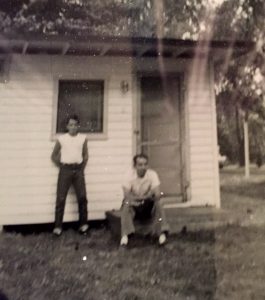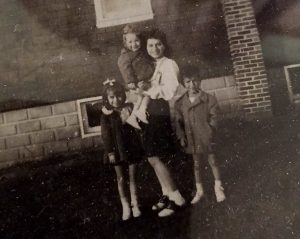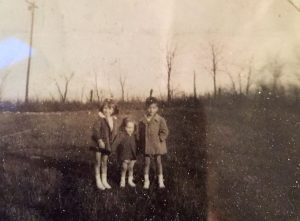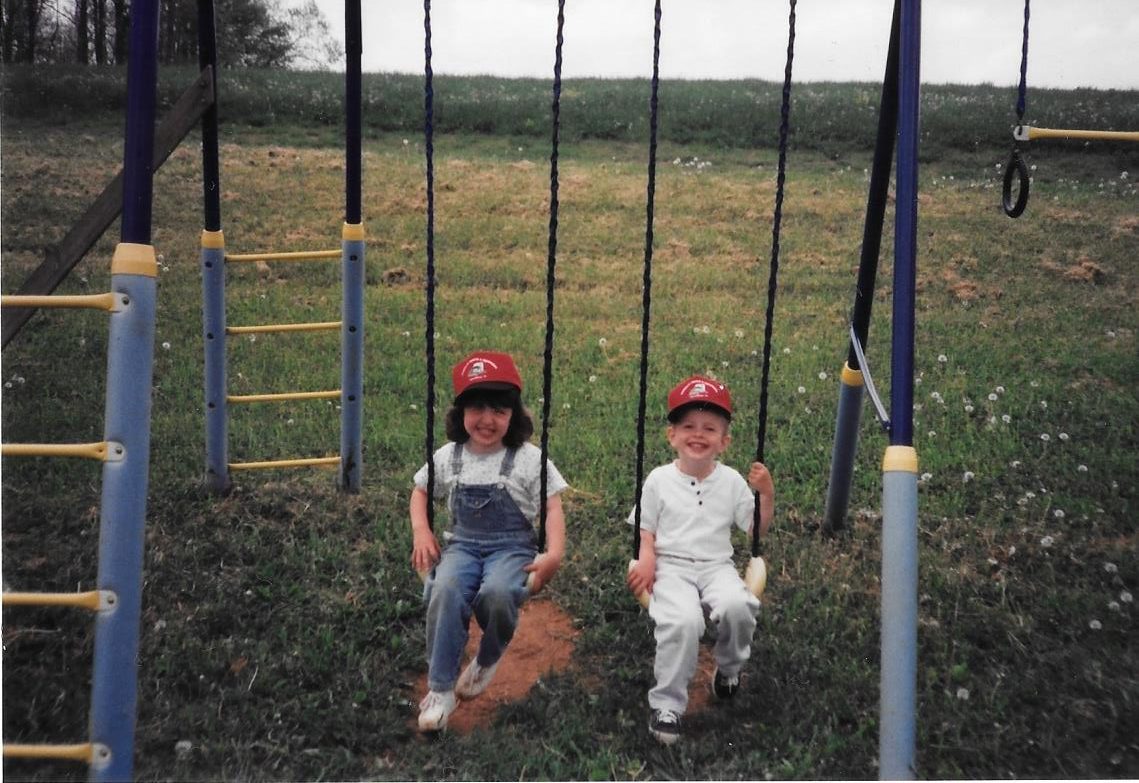
I tend to shy away from my origins. When you live in New York City, admitting to being a geographical transplant, unless you hail from somewhere hip like Abu Dhabi or Cape Town, is guaranteed to produce the most unenthused chorus of “Oh okay … cool”’s you will ever hear.
Over time, my answer to “Where are you from originally?” has zoomed out from the city of Pittsburgh, to just Pennsylvania, until finally I just mumble that I’m from the North East while trying to think of a redeeming personal fun fact. Yet my background, the core of who I am, stretches much farther back in time and place to a 100-person town called Van Meter.
My father was born here in 1943. The town occupies a small corner of riverside land, with the Pennsylvania-Erie Railroad line separating it from the litter-lined bank of the Youghiogheny. It is unclear when the town of Van Meter was founded. Likely, the town sprung up, as many others did, with the arrival of the Pittsburgh Coal Company in the early 1900s. Small company-based towns formed within walking distance to coal mines, and village life operated in a sort-of corporate harmony with them.
Van Meter (or Metre, depending) is not an uncommon name for place or person. As a surname, Van Meter is Dutch in origin; a derivative of the longer Van Meteren. Meaning literally “From Meteren” (a village in the Gelderland Region of the Netherlands), the name was American-born when Joosten Van Meteren settled Kingston, New York in 1662 — or so various genealogy websites have been kind enough to inform me.
Van Meter’s sole credit to fame was as the site of the worst coal-mining disaster in Pennsylvania history. The Darr Mine collapsed on December 19th, 1907. A record 239 men and children were killed due to a gas explosion caused by the use of open-flame lamps in underground areas. The Pittsburgh Coal Company was not found liable for the incident, and operations resumed as usual (though, open-flame lamps were now conveniently removed from the equation). This is the stuff of town legend.
My father’s father, John, like three-quarters of all other men in the town, was an employee of the Pittsburgh Coal Company. John and the men of the mine had been exempt from fighting in World War II. A “critical deferment” was issued, keeping him deep in the important work of creating energy on the home front, otherwise known as a bargain for black lung over German bullets. This came as a harsh blow to the intensely patriotic immigrant population of Van Meter, but they dutifully remained in the mines. Regardless, in 1943, there was time for my father to be born.
They, meaning my grandparents, dad, and his older brother Donald, lived in a duplex-style house provided by the coal company. Each half of the building featured four rooms: a kitchen, living room, and two bedrooms. A steep and narrow staircase led to damp unfinished basement. Behind their house, and most houses, was a 20’ by 30’ of patchy grass. Rickety tire swings and corrugated metal sliding boards often featured.
Most notably, the backyard was home to a tall wooden outhouse shared amongst the two families of the duplex. Indoor plumbing did not make its way to the dirt valley of Van Meter until the 1950’s. My dad was at least thirteen years old the first time he had the pleasure of watching his urine swirl into oblivion.
Yes, Van Meter was by no means advanced. Children were educated Laura Ingalls style in a two-room schoolhouse. Grades one through three occupied one room, and four through six the other. My father has a b
achelor’s degree in Biology and an MBA, as well as a decent grasp of the English language, so I assume things actually went pretty well in there. Nevertheless, the schoolhouse was finally shut down in 1955 and the youths of Van Meter entered into the modern, palatial-in-comparison world of the Rostraver public school system.

Few other public places existed in Van Meter. Activity was often centralized at the general store. Yet another establishment created by the Pittsburgh Coal Company, the store was a one stop shop for groceries, hardware, fishing and sports equipment, and everything else an impoverished community needed to keep the edges relatively smooth. During the holidays, the store would decorate their second floor with string lights and wreaths. For Christmas one year, my father asked for a basketball. He received a lopsided brown orb complete with laces — a feature that began its decline in the 1930’s — courtesy of the general store. Employees of the coal company could charge purchases directly out of their paycheck — a practice my grandfather rejected completely. The nearest comparable establishment was more than five miles out of town.
A novelty store was the only other institution to be found in town. This store sold popsicles, soft drinks, and beer. There was a pool table where the local old coots would gather to be crotchety in unison.
As a remote and insular town, those who came and went were counted among the strange and the wandering. The Pennsylvania-Erie line running along the river brought many of the stereotypical “hobo” character, tattered newsboy cap, tin cup and all. Though, these men were much less friendly than those in Pee Wee’s Big Adventure. These men were dark, grisly, and of questionable origins. They would hop off the car and go door to door asking for money, often explicitly with the intention of immediately re-investing it in the liquor industry. Once, my grandmother Madeline offered one of these men a bologna sandwich. My dad watched from the window as the man took the sandwich, examined it, and threw it on the front lawn in disgust.\
In the 1930’s Van Meter had boasted a boarding house, owned by my great-grandmother. Immigrants quickly filled the rooms with hopes of securing work in the coal mine. From its earliest days, the town was composed almost entirely of immigrants. One third of the population was fresh off the boat, and the other two-thirds were merely their spawn. If your relatives claimed connections to the Mayflower, Van Meter was not the place for you.
Van Meter’s prime paralleled an era where ethnic ghettos solidified and racial discrimination was rampant. Yet, almost idyllically, Van Meter was nearly devoid of such things. Polish, Ukrainian, Russian, Italian, and African-American families lived in almost equal proportions with non-existent divides between the factions. Unification existed based on the fact that no one had any hereditary claim to the land, and more importantly, everyone was poor.
Being the Fruit Roll-Up of poverty and dirt that it was, it was no secret that the outside world had little positive to say about Van Meter. Adults and children alike were scorned as river rats and lowlifes. Many years later, long after my father had left home for college and my grandparents had relocated to the nearby suburban area of Belle Vernon, my grandfather would find himself laden with guilt, wishing they had moved the family away from the town long before; offering a different childhood experience to my dad and his brother — perhaps one where the basketballs were made without laces. My dad vetoed this theory, asserting there never could have been a better place to grow up. It was a magical, isolated world of Little Rascals-style shenanigans and below minimum-wage idealism.
The way he tells things, it genuinely seems Van Meter was its own twinkling little planet. My own childhood was pleasantly over-populated with stories about the Van Meter days. Kids in the town had funny old-timey nicknames like “Peanuts” and “Skippy.” My dad and his friends would walk a mile and a half down the train tracks into the town of Smithton, where they’d see a Roy Rogers or Gene Autrey picture for the price of a nickel. At home, my dad and brother cut the bottom out of a metal coffee can, knotted together some wires to create a net, and used a ping-pong ball to play one on one in the basement. Sometimes, while flipping through the infinite pages of my Pokémon card collection, I thought I could only be so lucky to warm the bench of a ping-pong basketball game.
I speak of Van Meter in the past tense, as if it no longer exists. Certainly it does. Yet, there’s something about it that will forever be lodged midcentury, like a hair forever tickling the back of your throat. I was slightly less than ten years old when my dad drove my brother and I there on a sticky day of our summer vacation. I was crestfallen to have it revealed to me that the amusement park of my imagination was now a glorified trailer park. Oversized satellite dishes and dirty Playskool jungle gyms omnipresent. Men in American flag t-shirts and trucker hats sat on their porches with a Bud Light tucked into their meaty fists. They squinted carefully as we cruised by. The mine had closed almost half a century ago, leaving this miniature world a confused blip on the map. My dad informed us that, in fact, many of the people from his stories had remained here for the rest of their lives, raising children and grandchildren just as they had been raised. I half expected my dad’s return would warrant a parade and shouts of “Speech! Speech!!”

Coming of age in the suburbs of Pittsburgh, part of me was constantly fixated on loathing my surroundings. How could my parents let me grow up in such a cultural and intellectual wasteland? If I couldn’t walk to the grocery store or post office like a kid from Hey Arnold!, then what was the point in living at all? (I now live in New York City and am, more often than not, too lazy to walk to the post office.) Years later, at the age of 21, I understand what my dad was trying to tell me without ever really telling me — or maybe he did and I was just rolling my eyes and ignoring him. My dad had cut a thick slice of Van Meter and shared each morsel of it with my brother and I as we grew up. Though we were allowed an excess of cartoons and didn’t have to worry about a hobo knocking on our door, we knew how to explore the woods, play catch, wade in a creek, and clean the house. My brother even knew how to bait a fishing hook (I was too afraid of worms). I look at my friends who don’t know how to use detergent or be patient with waitresses and sigh, but I am also grateful.
My dad left Van Meter behind, so I too could leave somewhere behind. Of my four other siblings, I was the only one to set my sights beyond the borders of Southwestern Pennsylvania. While my friends’ parents urged them to remain close to home when choosing a college, I was concerned as to why my parents just smiled and nodded when I told them I was packing for Europe. But I get it now. It is wanted of me to want more. My forbearers emerged daily from a hole in the ground, soot-covered and weary to the core with the intention that I would sit here as I do now, whether they would ever know it or not. For Van Meter, I will keep the flame burning. Just not in an open-flame lamp.
Katie Fustich, born in Pittsburgh, lives in New York City. Her work appears in Vice, Jezebel, The Pacific Standard, Salon, and more. Visit her at http://katefustich.com



